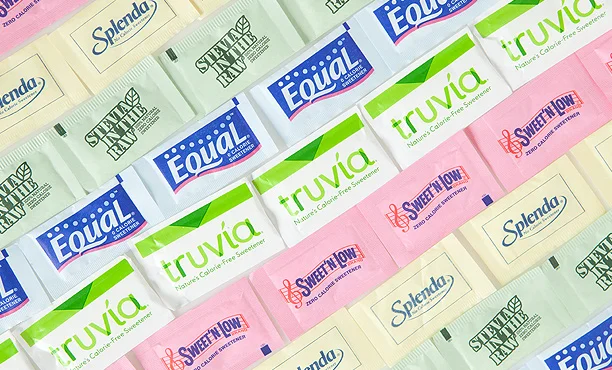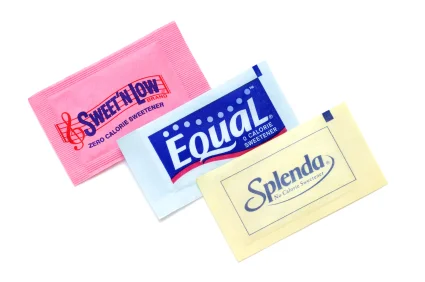Artificial Sweeteners May Fight Cancer
/For years, negative reports have surrounded artificial sweeteners, claiming evidence of everything from being a carcinogen to causing cardiovascular disease. However, new research suggests artificial sweetener could lead to new treatments for some of the most common types of cancers.
The findings were presented at the National Meeting and Exposition of the American Chemical Society. Researchers at University of Florida College of Medicine examined how saccharin reacted with a protein found in aggressive cancer cells
The Study
- Saccharin - artificial sweetener; main ingredient in Sweet 'N Low, Sweet Twin and Necta
- Saccharin reacted with a protein found in aggressive cancer cells
- The protein - carbonic anhydrase IX - regulates pH in and around cancer cells, allowing tumors to thrive and potentially metastasize to other parts of the body
- Saccharin reacted with a protein found in aggressive cancer cells
This protein is found in a wide range of aggressive cancers including:
- Breast cancer
- Lung cancer
- Liver cancer
- Prostate cancer
- Pancreatic cancer
- Kidney cancer
The Results
Researchers found that saccharin-based drugs may stunt the growth of these cancers, preventing them spreading by binding to the carbonic anhydrase IX that’s encouraging those ideal conditions for cancers to take hold and spread in the body.
Study author, Brian Mahon (graduate research assistant at the University of Florida) noted:
“If you disrupt this pH balance via blocking CA IX activity, you can stop these cancer cells from growing and proliferating.”
Researchers stemmed from a study from the University of Florence in Italy that suggested saccharin would selectively block the activity of CA IX. This furthered the need look deeper at saccharin’s effect in treating cancer.
It's important to note that carbonic anhydrase IX is not normally found in healthy human cells – except in GI tract. Drugs with saccharin shouldn’t interfere with the growth of healthy tissues or cause unintended side effects; the sweetener would simply bind to the harmful protein.
This makes it a prime target for anti-cancer drugs.
- They would cause little to no side effects to healthy tissue surrounding the tumor
- Previous attempts to find an element that blocks CA IX without damaging other cells have been unsuccessful
- Researchers used X-ray crystallography to determine how saccharin binds to CA IX, and are using that information to develop ways to fine-tune and improve its anti-cancer treatment potential
Cancer Research
The goal is to develop drugs that could slow the growth of these cancers and potentially make them less resistant to chemo or radiation therapies. Currently, saccharin’s effects are being tested on breast and liver cancer cells.
Samadi's Take
The results from this study opens up the potential to develop a novel anti-cancer drug that is derived from a common condiment that could have a lasting impact on treating several cancers. The findings don’t necessarily warrant adding large quantities of artificial sweeteners to your diet, but it may offer promise for the development of an anti-cancer drug derived from an ingredient that ironically was once considered a possible carcinogen.
WHAT IS SACCHARIN?
- Artificial sweetener
- Contains no food energy
- About 400 times as sweet as sucrose or table sugar
- Found in drinks, canned goods, candy
- Other artificial sweeteners include:
- Aspartame – Equal, Splenda
- Sucralose - Splenda
ARTIFICIAL SWEETENERS
• Commonly used to replace natural sugar, so that the negative effects that are associated with sugar intake can be significantly reduced.
• For a number of years, artificial sweeteners were a popular ingredient for the manufacturing of food, but their popularity started to decline after consumers discovered that they have negative health effects.
TWO TYPES OF ARTIFICIAL SWEETENERS
- Non-caloric sweeteners
- Contain no calories
- Main ingredient in many foods and drinks
- Don't cause cavities - widely considered a better option than natural sugar
- Sugar alcohols
- Contain the same amount of calories as natural sugar
- Commonly used in chewing gums, candies and throat lozenges
- Still cause fewer dental problems than regular sugar
SIDE EFFECTS OF ARTIFICIAL SWEETENERS
- Use of artificial sweeteners has become controversial due to the health effects that are experienced by people who consume them
- Fact - artificial sweeteners are made of chemicals– not healthy
- Studies have shown links to cancer
- Evidence showing that Aspartame can lead to seizures, headaches and attention deficit disorders.
- Some people experience heart palpitations, constipation and swelling of certain body parts after consuming this artificial sweetener
- Other health effects include increase in body weight, fat percentage and caloric intake
- Regular intake of artificial sweeteners can lead to addiction
- Diet cokes, other sweetened drinks due to the addition of sweeteners
- Artificially-sweetened drinks and food can lead to change in taste buds, development of cravings and activation of the pleasure centers in the brain that ultimately causes addiction
BENEFITS OF ARTIFICIAL SWEETENERS
- Artificial sweeteners are not necessarily harmful to everyone.
- They can reduce cavities and tooth decay and lower body calories.
- Can also be used to neutralize bitterness in certain medicinal products.
- However, artificial sweeteners should still be avoided, since the disadvantages outweigh the advantages
- Artificial food sweeteners can be detrimental to the health and development of the brain, as well as overall health.
WHERE DID ARTIFICIAL SWEETENER STIGMA DERIVE FROM?
Back in the 1970s, scientists found a link between saccharin and bladder cancer in lab rats. By law, this finding required a warning on packaging for saccharin products, and so the sweetener was then slapped with a label indicating risks for consumption —and a stigma. After subsequent testing, researchers found out that rats have high pH levels, high calcium phosphate, and high protein levels in their urine — something that humans don’t have.
Conditions led proteins in the urine to bind to the saccharin, producing tiny microcrystals that harm the bladder lining. In the late 1990s, the National Toxicology Program and the International Agency for Research on Cancer looked at all the available research on saccharin, and determined it is not a human carcinogen.
In 2011, the Environmental Protection Agency removed saccharin from its list of hazardous substances. However, the stigma has remained
HEALTHY ALTERNATIVES FOR ARTIFICIAL SWEETENERS:
- Agave nectar
- Nectar produced from agave cactus
- Taste and texture similar to honey
- oesn’t contain as many antioxidants as honey, but it contains approximately the same amount of calories
- Agave is sweeter than sugar - you can use less to get similar sweetness
- Honey
- Contains trace amounts of vitamins and minerals
- Studies suggest it may not raise blood sugar as fast as other sweet products
- Better for the body to have a slow and steady rise in blood sugar after eating, rather than a dramatic spike
- Does contain calories and should be used as sparingly sweetener
- Stevia
- Derived from the stevia plant, stevia leaf extract
- Natural alternative to artificial sweeteners
- Artificial sweetener
- Contains no food energy
- About 400 times as sweet as sucrose or table sugar
- Found in drinks, canned goods, candy
- Other artificial sweeteners include:
- Aspartame – Equal, Splenda
- Sucralose - Splenda
ARTIFICIAL SWEETENERS
• Commonly used to replace natural sugar, so that the negative effects that are associated with sugar intake can be significantly reduced.
• For a number of years, artificial sweeteners were a popular ingredient for the manufacturing of food, but their popularity started to decline after consumers discovered that they have negative health effects.
TWO TYPES OF ARTIFICIAL SWEETENERS
- Non-caloric sweeteners
- Contain no calories
- Main ingredient in many foods and drinks
- Don't cause cavities - widely considered a better option than natural sugar
- Sugar alcohols
- Contain the same amount of calories as natural sugar
- Commonly used in chewing gums, candies and throat lozenges
- Still cause fewer dental problems than regular sugar
SIDE EFFECTS OF ARTIFICIAL SWEETENERS
- Use of artificial sweeteners has become controversial due to the health effects that are experienced by people who consume them
- Fact - artificial sweeteners are made of chemicals– not healthy
- Studies have shown links to cancer
- Evidence showing that Aspartame can lead to seizures, headaches and attention deficit disorders.
- Some people experience heart palpitations, constipation and swelling of certain body parts after consuming this artificial sweetener
- Other health effects include increase in body weight, fat percentage and caloric intake
- Regular intake of artificial sweeteners can lead to addiction
- Diet cokes, other sweetened drinks due to the addition of sweeteners
- Artificially-sweetened drinks and food can lead to change in taste buds, development of cravings and activation of the pleasure centers in the brain that ultimately causes addiction
BENEFITS OF ARTIFICIAL SWEETENERS
- Artificial sweeteners are not necessarily harmful to everyone.
- They can reduce cavities and tooth decay and lower body calories.
- Can also be used to neutralize bitterness in certain medicinal products.
- However, artificial sweeteners should still be avoided, since the disadvantages outweigh the advantages
- Artificial food sweeteners can be detrimental to the health and development of the brain, as well as overall health.
WHERE DID ARTIFICIAL SWEETENER STIGMA DERIVE FROM?
Back in the 1970s, scientists found a link between saccharin and bladder cancer in lab rats. By law, this finding required a warning on packaging for saccharin products, and so the sweetener was then slapped with a label indicating risks for consumption —and a stigma. After subsequent testing, researchers found out that rats have high pH levels, high calcium phosphate, and high protein levels in their urine — something that humans don’t have.
Conditions led proteins in the urine to bind to the saccharin, producing tiny microcrystals that harm the bladder lining. In the late 1990s, the National Toxicology Program and the International Agency for Research on Cancer looked at all the available research on saccharin, and determined it is not a human carcinogen.
In 2011, the Environmental Protection Agency removed saccharin from its list of hazardous substances. However, the stigma has remained
HEALTHY ALTERNATIVES FOR ARTIFICIAL SWEETENERS:
- Agave nectar
- Nectar produced from agave cactus
- Taste and texture similar to honey
- oesn’t contain as many antioxidants as honey, but it contains approximately the same amount of calories
- Agave is sweeter than sugar - you can use less to get similar sweetness
- Honey
- Contains trace amounts of vitamins and minerals
- Studies suggest it may not raise blood sugar as fast as other sweet products
- Better for the body to have a slow and steady rise in blood sugar after eating, rather than a dramatic spike
- Does contain calories and should be used as sparingly sweetener
- Stevia
- Derived from the stevia plant, stevia leaf extract
- Natural alternative to artificial sweeteners



